The Homesteaders Handbook: Raising Chickens Part 8
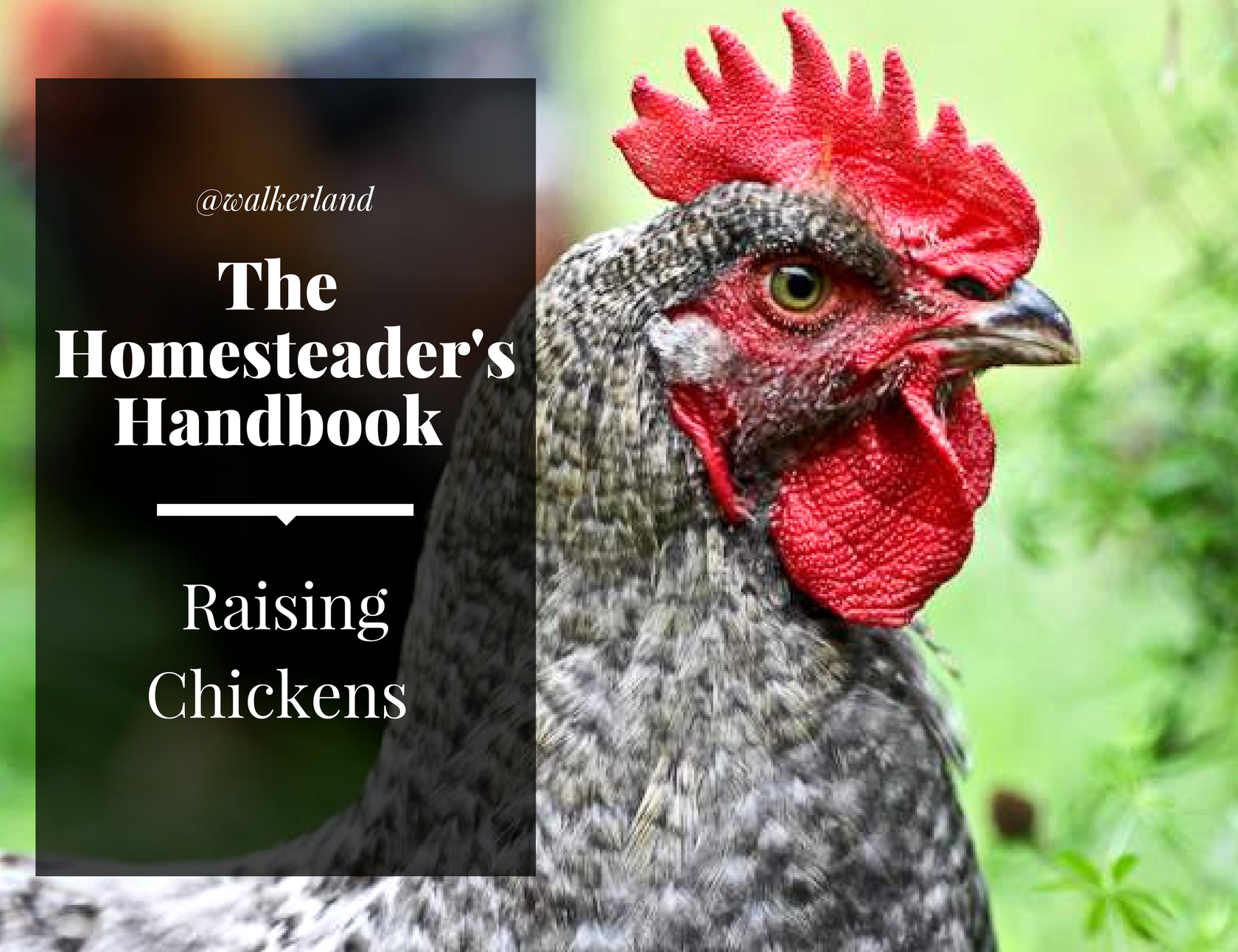.jpg)
This is the eighth part in a complete series on raising chickens! In this chapter we'll talk about the handsome guardians of the flock: The roosters.
You can read earlier chapters in the series here!
Raising Chickens Part 1 - Things To Know Before You Start Raising Chickens
Raising Chickens Part 2 - Breeds, hybrid vs heritage and more
Raising Chickens Part 3 - Coops, mobile chicken tractors, bedding, chicken tunnels
Raising Chickens Part 4 - Shelters: Coop cleanliness, human health, free ranging
Raising Chickens Part 5 - Baby chicks
Raising Chickens Part 6 - Hens
Raising Chickens Part 7 - Broody hens and hatching chicks naturally and using an incubator.
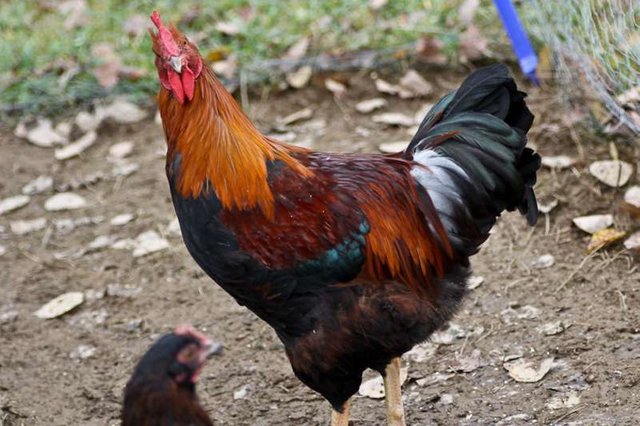
Roosters
Roosters are beautiful, their plumage is far more colourful and ornate than the hens. They look good and they know it, walking around with a confident strut. They are engaging to observe and can be tremendously helpful as a guardian of your flock. They spend most of the day watching and scanning for danger. If you want fertile eggs for hatching or simply love waking up to a cock-a-doodle-doo crow in the mornings, then a rooster might be perfect for you.
The Trouble with Roosters
When you pick up your chicks sometimes even when you think they are all hens, you will end up with a rooster or two. A lot of chicks are sold as strait run which means that its a roll of the dice as to how many are going to be male or female. Either way, there is a chance you will have a rooster to deal with at some point.
We had six roosters in our first batch of chicks. I was able to give away four to someone who desperately needed to replace their breeding stock, and after a month of trying to make it work (and failing miserably) the other two roosters ended up visiting the chopping block.
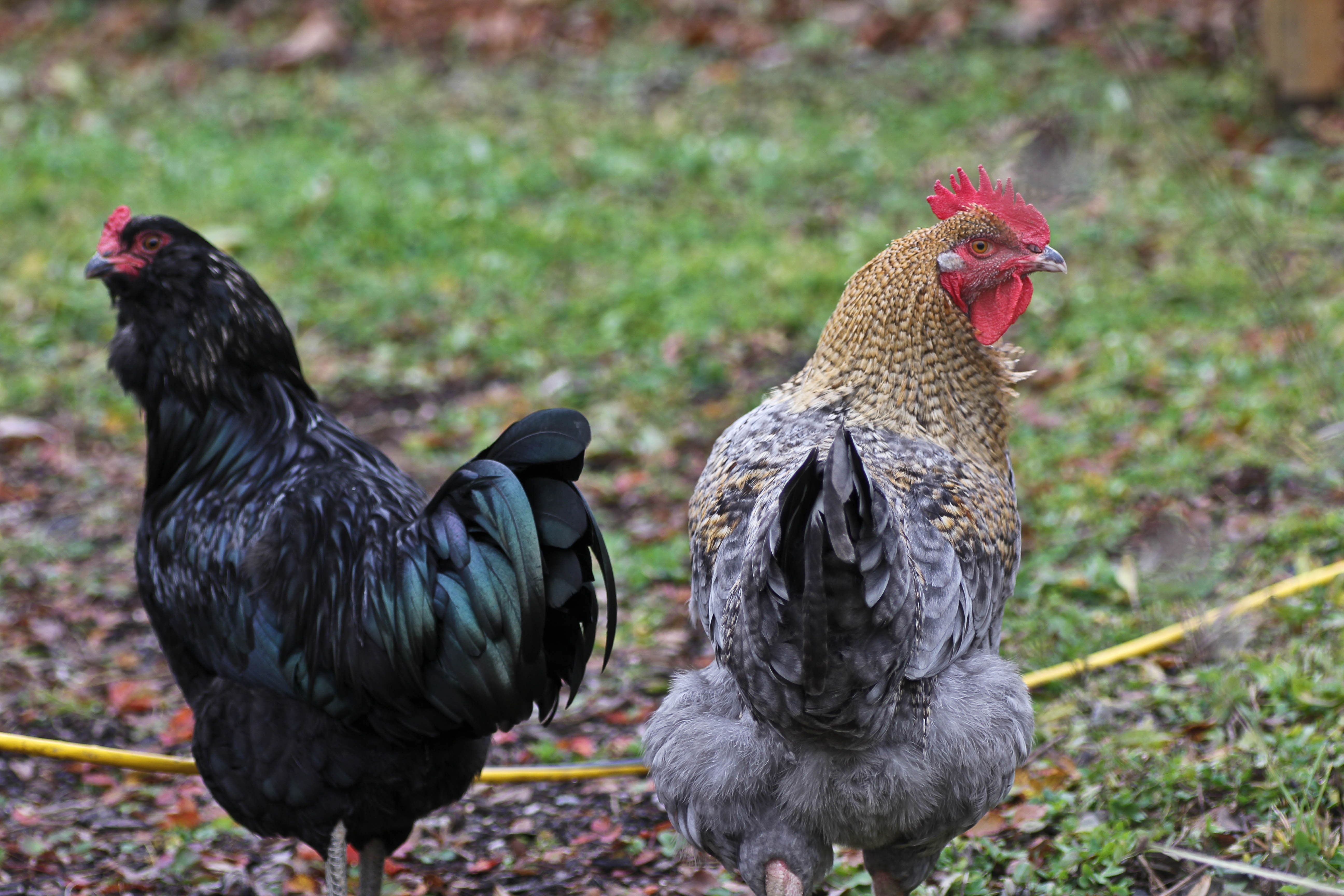
The sex of your chickens does not really matter much until they start to hit sexual maturity. When the hormones kick in, that is when things start to go wrong. The harmony and happiness in the coop will diminish as the hormones rage and friend turns into foe as the roosters fight for dominance over the flock.
Sometimes you might hope that because they were raised together and have gotten along so well that they might just keep getting along. That's just not how nature works. If you have multiple roosters there are things you will be forced to decide.
What Do You do With Excess Roosters?
Kijiji is overrun with "rooster to give away" because a lot of people realize that they have all these roosters that can't stay with the rest of the flock and they realize that culling them is not as easy on the heart as they initially imagined it to be. It isn't easy to kill something, it's not supposed to be. The ability to humanely "euthanize" a chicken, or access to someone who can is pretty much an essential part of the deal. Be prepared.
Roosters can be used for meat. If you intend on doing this the best age is around 14 weeks. The breed and the age of the bird will impact the amount and quality of the meat you get. If the meat is tough, cockerel soups and stews are a perfect solution. If you have a lot of roosters you might be able to arrange to have them delivered to a local farm with a processing facility and have them do the difficult work for you. If you intend to do this be sure to book well in advance these facilities tend to be very busy.

Flock Protection
A rooster can do a marvellous job of caring for the flock. His job is to watch for threats and alert the hens and often his presence keeps the flock in calmer. Not all roosters are cut out for this job however. Watch and observe the roosters and try to pick the right guy for the task. We had kept our rooster based on breed and not skill and that was a mistake.
I would be working in the back field out of earshot but our property has an echo so you hear just about everything. I would suddenly hear the rooster shrieking his warning call. The hens would be running around smashing into things panicked, screaming their heads off and I would run over thinking there was an attack. It would usually be something like a leaf that fell from a tree. A leaf!
This went on for a while and then one day in a case of the “rooster that cried wolf” I ignored it until I was finished my task and then headed over. Unfortunately it was a real cry for help. Harold was not cut out to be leader of any flock and eventually ended up in the soup pot.
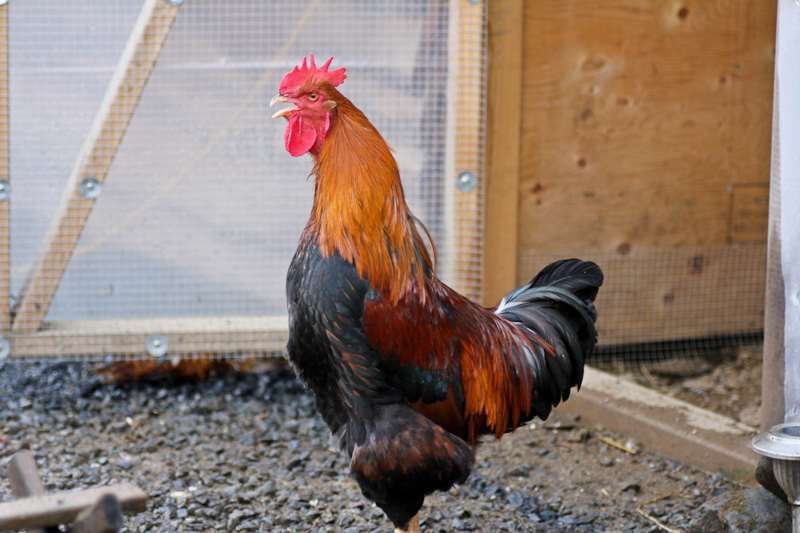
Is it a Hen or a Roo? How Can You Tell?
Young chickens generally appear the same and it's really hard for the average person to discern a male (cockerel) from female (pullet). In fact even professionals get it wrong sometimes. I often hear about someone who bought a speciality hen only to discover that she was in fact a he. It's actually a common guessing game on poultry Facebook groups. Someone will post a photo of their chicken and others will guess the sex of the chicken. This does not always end up giving you an accurate result. Sometimes you just have to wait until it becomes very obvious. The clear physical differences that will start to appear between a hen and a rooster are:

Feathers
Roosters develop very distinguished hackle (neck) and saddle (back) feathers and tail (sickle) feathers. Their plumage is far showier than the hens.
Legs
Roosters usually have thicker legs than hens. They also have sharp pointed spurs. The rooster will use these spurs to protect his flock and to defend himself. Spurs are sharp growths just above the toes on the rooster's leg. Old hens will sometimes develop spurs as well but they will not be as long or sharp.
Wattles and Combs
Styles of wattles (head area) and combs (neck area) vary among breeds but a rooster will always have taller wattles and larger combs than hens of that same breed. If the rooster is young, he will have a more pronounced comb than a female chicks of the same age. Roosters tend to have redder combs and wattles at an earlier age than hens of the same age.
Colouring
Roosters generally have showier plumage than hens. Their colors are often brighter and more vibrant. Many roosters have iridescent feathers that capture the light and show off beautiful blue and green highlights. If the bird has iridescent plumage, it is most likely a rooster.
Crowing
Although It is apparently possible to end up with a crowing hen in your flock, it is not typical. Crowing is a clear sign that you have a rooster.
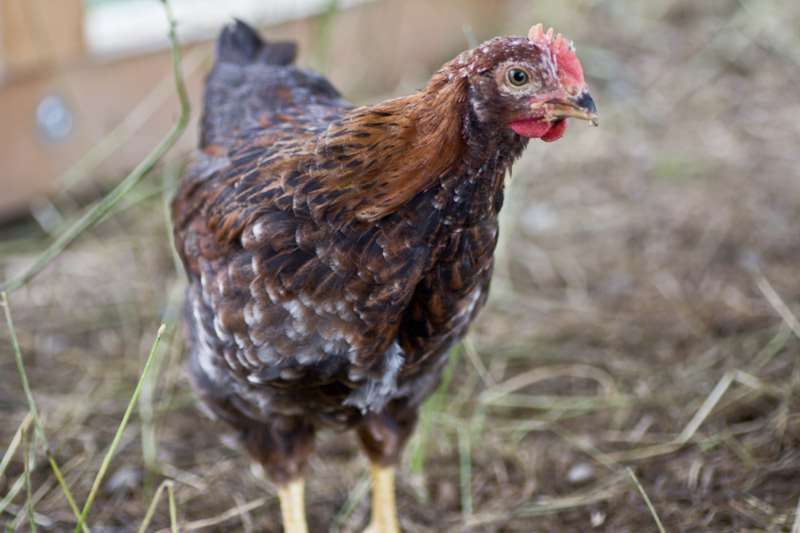
Mating
Should you want to hatch more chicks you will need a rooster to fertilize the eggs. Hens will lay eggs without a rooster but the eggs will not be fertile. One rooster with a flock of 8-12 hens is about the ratio you should consider. Too many roosters in the hen house is going to cause problems. Mating can be rather shocking to first observe. It can appear rather brutal.
Roosters will make their move by dropping their wings and sort of dancing around the hen in a circle. If receptive the hen will squat down and lower her back. The rooster then mounts her by grabbing her by the back of the neck with his beak and clinging to her lower back with his claws. I have noticed that our rooster skips the dance and get's right to business these days. I guess the honeymoon is over. It is a very brief interaction. He will then move onto another hen until he has done his rounds for the day.
If you have too few hens per rooster it can cause real problems. It's in a roosters nature to reproduce and they will try to mate with their hens as much as they possibly can. This can lead to hens refuse to cooperate. They get tired of being harassed. Over mating can cause a hen to lose feathers on her back. Roosters can also tear open a hens skin with his claws. This of course leads to issues for the hen because the hens will peck at her. If a hen is wounded you will want to remove her immediately so that she can heal.
We had one hen that the rooster was favouring and she developed a rather large bald spot on her back. In typical chicken fashion the hens gravitated to this vulnerability and pecked this spot repeatedly making matters far worse for the poor girl. We tried a lot of different things but in the end we sprayed something bitter tasting on her to stop the pecking and over time it all grew back in. There are saddles that you can put on your hens to prevent baldness but the ordeal of catching and putting it on made it a no go for us.
Breeding
Although your roosters can be in with the hens continuously, if you are trying to hatch specific breeds, you will need to create large self contained (food, water, nesting boxes, bedding etc) pens to separate the breeds until you have collected sufficient fertilized eggs for hatching.
Crowing
You know that nostalgic childhood vision of a rooster crowing at sun up? Well, roosters crow at all times of the day (and night) and when there is more than one of them they will crow to one another. Crowing can be charming and it can also be terribly annoying. Be sure to talk to any neighbours you have. You won't be too popular if your roosters are waking up the neighbours.
Aggression
Like humans Chickens come with a range of personalities. An aggressive rooster must be dealt with immediately. If you have small children I suggest immediate culling because most often the aggression is unpredictable and difficult to modify. You need to read the signs though. If a rooster detected you were a danger to one of the hens he might attack and that is natural protective behaviour. Others just have a nasty personality.
Roosters give indicators that you should be mindful of. They will often fluff up their feathers in a sign that they are detecting threat. When they begin to posture in that manner you need to stop what you are doing and back off. You can then evaluate the situation safely. They can hurt you quite a bit if they do attack which is why you should always supervise children.
Always be mindful of your chickens when you are with them, even when you get to know them.
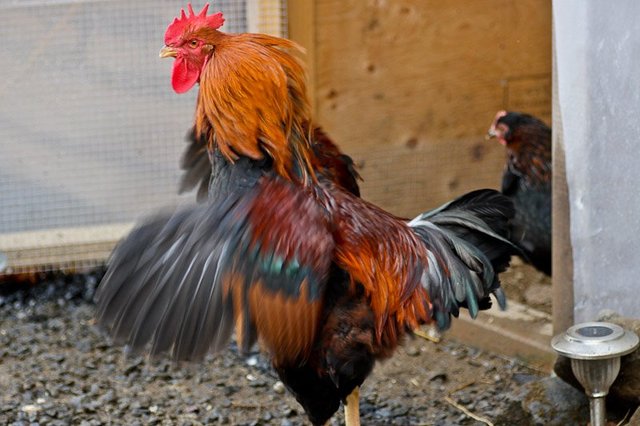
Boys Club
Often when you put roosters together with no hens, they can live together quite amicably. They could have been fighting to the death that morning around the hens only to be best pals in the afternoon once they are in their own area. If you want to keep roosters, setting up a boys only coop and run is an option.
Next time we'll get into injury & illness and answer some common questions we get asked about raising chickens.
This content comes from my Ebook "The Homesteader's Handbook: Raising Chickens". It's available on Amazon here. If you'd like to leave a review you can do so there! I've decided to give the knowledge away here on steemit where it may help those looking to get into raising chickens. This was always my intention when writing this book.
All rights reserved. Photos copyright @walkerland The information in this book is true and complete to the best of our knowledge. All recommendations are made without guarantee. The author and publisher disclaim any liability in connection with the use of this knowledge.
Building a greener, more beautiful world one seed at a time.
Homesteading | Gardening | Frugal Living | Preserving Food| From Scratch Cooking|
You can also find me at: walkerland.ca | Facebook
Photo copyright: @walkerland

Thanks a million for sharing good post @walkerland ( ‘‿’ )
Thanks! :)
Excellent post on Roosters and behaviors! Too bad more people don't plan what they are going to do if they end up with roosters....
well ... I'll admit years ago when I first got chickens I really overlooked some of these details myself. I think I read too many articles from people who glossed over the ugly side of keeping chickens. One things forsure what I didn't know the chickens quickly taught me! :)
I giggled at "I guess the honeymoon is over." Hahaha! Also at all the hens panicked over Harold's alarm at a leaf. I'm just picturing the mayhem :)
Thanks for the link to your book, too!
hehe ... hmm, that was a bit brash to write in an ebook. I guess when you are your own publisher you can do what you want! :)
That rooster was a nightmare. He would crow at all hours and cause chickens to panic repeatedly. He was destroyer of the peace and not good for egg production either. We were going to hide him in a neighbours barn because he thought our predicament was so funny... but in the end as the queen of hearts would say, "off with his head".
You were awfully tolerant to let him live as long as you did...I told the Husband your nightmare rooster story and he said about the third time it crowed "at the wrong time of the day" he'd have been out there with a shotgun. I guess that's his idea of "off with his head"! I'm lol'ing at the idea of hiding the rooster in the neighbor's barn as revenge!
My husband was ready to off him almost immediately. I am always trying to rescue things. Its quite the comedy of errors sometimes. I'll learn eventually.
Wow, great post! And now I have to go and read the other ones.
I sub'd, and thank you for posting this content. I look forward to going through some of your older posts and as well as the new ones.
Keep up the great work. Sorry my upvote doesn't produce much revenue. I'm not quite there yet. have a nice day.
Hey Thanks! Glad you liked it.
Never dealt with poultry growing up on a dairy farm. Was given a goose once by a neighbor. That animal was EVIL! Had to be put under after attacking my father. Attacking me, my mom, or my 2 little brothers was fine. The minute he attacked my father it met the business end of a shot gun! No questions asked.
Made bad meat for eating, too! Am a die hard beef eater. Chicken is fine if done properly. Turkey is great when cooked well. Some fish is good. I even enjoy an occasional frog leg.
My husband would like to raise a few cows but I'm not sure I would have the heart to let him slaughter them. It's a bit of a struggle and he likes beef best as well. I am a die hard vegetarian - I'll eat anything that's green (lol).
At least when you raise your own animals you KNOW what they eat! No chemicals in their systems unless you allow them to come in. Grass and clover work best for the most part. Adding some grains to their diets occasionally helps firm up the meat on their bodies.
Absolutely. You know what they eat and also how they live. There really is no better way. There is a saying I heard that really stock with me: "You are what you eat eats too".